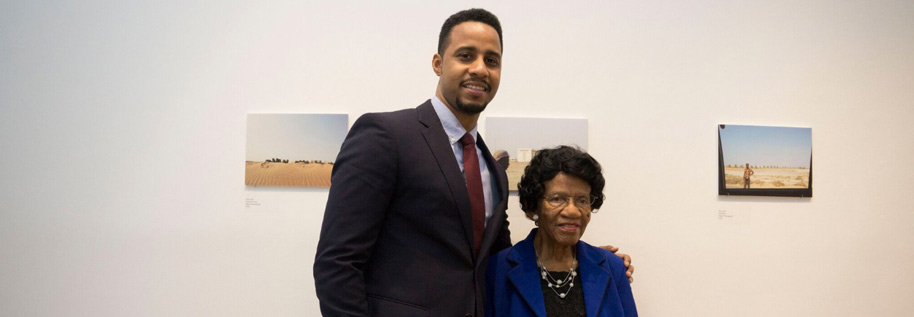When Anne Gayles-Felton (M.A. ’47) decided to create a new scholarship at Teachers College, her goal was to help students who, like her, are devoted to helping others get an education.
She could not have found a more likely recipient than Angel Acosta, the inaugural Anne R. Gayles Felton Endowed Scholar. By his own count, Acosta, who is pursuing a doctoral degree in the College’s Curriculum & Teaching Department, has helped mentor students at 200 schools in nine states, helping them improve academically and socially and develop leadership skills.
“Angel is a first-generation college student of Dominican descent who works many jobs to be here at the College,” says Acosta’s adviser, Celia Oyler, Professor of Education. “He is also the first in his family to attend college in America. He’s deeply insightful, very kind, and he’s pursuing important work with high school youth, helping them with college access."
Before enrolling at Teachers College, Acosta – who was the unanimous choice of Curriculum & Teaching faculty to receive the Gayles-Felton Scholarship – worked for six years as a program director for College for Every Student (CFES), a nonprofit organization that helps middle school and high school students from low-income families prepare for college. Acosta, who was one of those students himself, still works part-time for the organization and consults on leadership development for New York City’s public schools. Thanks to the Gayles-Felton scholarship, he’ll be able to work less and focus more on his studies.
“I am beyond grateful for the gift you have given to me,” Acosta wrote in a recent email to Gayles-Felton, who taught for 45 years at Florida A & M University. “With this scholarship, you not only contribute to the development of the communities I work with, but also to the lives of my 10 nephews and nieces, who look up to me as the first in my family to graduate from college and pursue a doctorate degree. I promise to, like you, be a trailblazer and a force for good in the field of education.”
Acosta seems well on his way toward that goal. At TC, he works as a graduate assistant to Oyler, who runs the Teachers College Inclusive Classrooms Project, which is helping the New York City public school system to ensure that all students thrive. He also has been featured in two documentary films – The Bro-Code: How Contemporary Culture Creates Sexist Men (2011), and Dissed Respect: The Impact of Bullying (2006) – and participated in the Harvard Summer Institute on College Admissions as well as the Education Without Borders Global Conference in Dubai. He is a polished and dynamic public speaker, lending his voice to, among other efforts, helping CFES expand to other countries.
Acosta grew up on Manhattan’s Lower East Side. His parents, who were born in the Dominican Republic, struggled financially. He attended Seward Park High School in Manhattan, where, by his own admission, he was “an average student” who could have easily taken the “wrong path in life.” An interest in sports kept him in line, he says, and when he was a junior in high school he joined College for Every Student. Helped by teachers there to study and hone his leadership skills, he attended the State University of New York at Plattsburgh, where he earned a bachelor's in Anthropology and a master’s in Leadership Studies.
For his doctoral research at TC, Acosta is exploring the intersection of social justice education, college access and mindfulness.
“It’s a fresh, unique approach to building students’ critical consciousness while also taking into account their well-being,” says Acosta, who is a trustee for the Center for Contemplative Mind in Society. “Students need to address inequities in our educational system, but they should also be equipped with skills to live healthy lives. They must learn how to hold leaders accountable and to change the structures that produce inequities. At the same, they need balance and mindfulness in their lives.”
After TC, Acosta intends to work as a professor of education and to continue to do research. His ultimate goal: to become a college president.
“I see myself nurturing a campus culture committed to critical inclusivity, academic rigor and social justice,” he says. “This kind of institutional leadership will aid in producing the future scholars and leaders that our world desperately needs.” – By Robert Florida
